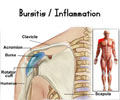Blocking the action of a signalling molecule in the immune system could prevent insulin resistance and inflammation associated with obesity, a new study found

Among the study's key findings was that inflammatory macrophage buildup is controlled by Netrin-1, which not only attracts more macrophages into fat tissue, but also prevents macrophages from carrying away pathogens and unwanted fat cells as the immune cells would normally do. Uncontrolled inflammation is known to damage arteries and vital organs.
"Our study results show that targeting Netrin-1 can lessen and possibly reverse the chronic inflammation and insulin resistance associated with major diseases tied to obesity, such as atherosclerosis and type II diabetes," says senior study investigator Kathryn Moore, PhD, a professor of medicine and cell biology at NYU Langone Medical Center. "Our goal, of course, is to let inflammation do the infection-fighting tasks it is supposed to do while stopping it from producing any disease-causing effects in fatty tissue that it is not supposed to do."
Lead study investigator Bhama Ramkhelawon, PhD, a postdoctoral fellow in Dr. Moore's lab, says the team's latest findings are believed to be the first to identify a chemical signal that stalls macrophage movement out of fat tissue and causes the chronic inflammation driven by obesity and fatty diets.
According to Dr. Ramkhelawon, Netrin-1 stops macrophages in their tracks, holding them back from continuing their journey to interact with other immune cells and from performing their job in clearing away damaging molecules that accumulate in diseased tissue.
Moore says the team's experiments followed directly from their 2012 research findings published in Nature Immunology, which showed that Netrin-1, a chemical typically associated with nerve development, was abundant and overactive in macrophage cells in atherosclerotic plaques. The team's earlier research had also shown that Netrin-1 bound to macrophages at a protein receptor site called Unc5b, whose action was similarly found to be elevated in fat tissue.
Advertisement
Researchers found that feeding mice a high-fat diet for 20 weeks upped production by as much as 50 percent of both Netrin-1and Unc5b when compared to levels of both in mice fed a lean diet. Results matched Netrin-1 and Unc5b analyses in macrophage samples from fat tissue samples in a dozen people, half of whom were obese.
Advertisement
Macrophage samples from the fat tissue of obese mice showed reduced movement out of fat tissue. When researchers blocked Unc5b receptors, preventing Netrin-1 attachment, macrophage migration activity was restored.
Additional experiments in mice bred with and without Netrin-1-producing macrophages showed lower inflammation and macrophage movement only in obese mice without Netrin-1. This, in turn, was tied to improvements in a half-dozen metabolic markers of insulin resistance, which builds during obesity, with Netrin-1-deficient mice showing at least 50 percent better blood-sugar control than mice with Netrin-1-producing macrophages.
Researchers next plan to develop highly specific, Netrin-1-inhibiting drugs, which can be targeted to specific macrophage cells or fat tissues as nanotherapies or delivered via catheters, so Netrin-1 function in non-fat tissue elsewhere in the body is allowed to continue normally. They also plan studies to determine when inflammatory damage is likely permanent and non-reversible.
Source-Eurekalert














